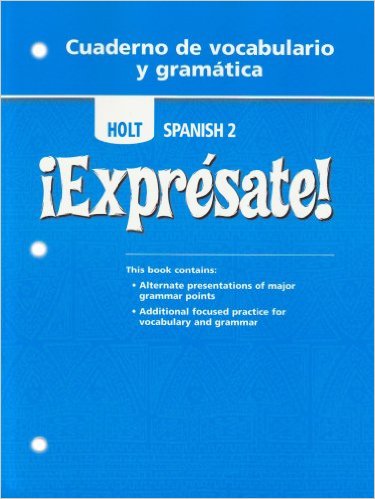
All Solutions
Page 10: Gramatica
The verb with which the sentence begins is *bebes*, which means *drink*. To form the affirmative informal command we need to drop the -s, getting *bebe*. We must also place the direct object pronoun at the end, in this case it would be *la* because we are talking about milk: **bébela**.
|Spanish |English |
|–|–|
|Bebes mucha leche todo el día. Bébela después de cenar. |You drink a lot of milk all day. Drink it after dinner. |
In this case, we need to form the affirmative informal command of the verb *cantas*, which means *sing*. If we drop the -s we get *canta* and we must place the direct object pronoun at the end again we are referring to the song: **cántala**.
| Spanish| English|
|–|–|
|Cantas la canción muy bien. Cántala en la fiesta. |You sing the song very well. Sing it at the party. |
We need to form the affirmative informal command of the verb *miras*, which means *look*. If we drop the -s we get *mírala* and if we place the direct object pronoun (which is *las* because we are talking about flowers) we get: **míralas**.
| Spanish|English |
|–|–|
| Miras las flores en el jardín. Míralas en el patio. | You look at the flowers in the garden. Look at them in the yard.|
We need to form the affirmative informal command of the verb *dibujas*, which means *draw*. If we drop the -s we get *dibuja* and if we place the direct object pronoun (which is *los* because we are talking about animals) we get: **dibújalos**.
| Spanish| English|
|–|–|
|Dibujas los animales de color negro. Dibújalos de colores. |You draw the animals in black. Draw them in colors. |
We need to form the affirmative informal command of the verb *sirves*, which means *serve*. If we drop the -s and we place the direct object pronoun (which is *lo* because we are talking about dessert) we get: **sírvelo**.
|Spanish |English |
|–|–|
| Sirves el chocolate a tu abuela. Sírvelo con el postre.| You serve the chocolate to your grandmother. Serve it with dessert.
In some cases we must include the direct object pronoun, following the example.
We must form the negative informal comand of the verb *saltar*, which means *to jump*. Remember that since this verb ends in -ar, we must change that to -es. Also, to form the informal negative command we must include *no* in front. Doing all this we get: **no saltes**.
|Spanish |English |
|–|–|
|No saltes en la cama. |Don’t jump on the bed. |
In this case, we have an irregular verb: *ir*, which means *to go*. Remember that we must include *no* in front. The negative informal command for this verb is: **no vayas**.
|Spanish |English |
|–|–|
|No vayas al cine solo. |Don’t go the movies alone. |
To form the negative informal command of the verb *limpiar* which means *to clean*, we must change the ending -ar to -es and include *no* in front the verb. Doing all this we get: **no limpies**.
Furthermore, since we are talking about the bathroom, we can include the direct object pronoun *lo*. This must be between *no* and the informal negative command.
|Spanish |English |
|–|–|
| No lo limpies.| Don’t clean it. |
In this case, we must form the negative informal command of the verb *correr*, which means *to run*. Unlike the previous verbs, as this one ends in -er we must change its ending to -as, obtaining *corras*. If we include *no* in front of the verb we get: **no corras**.
|Spanish |English |
|–|–|
|No corras en la piscina. |Don’t run in the pool. |
In this case, we must formt the negative informal command of the verb *llegar*. In the case of this verb, since it ends in -gar we must change the -ar to -es (as we know) but we must also replace -g with -gu, obtaining: *llegues*. If we include *no* in front of the verb we get: **no llegues**.
|Spanish |English |
|–|–|
| No llegues tarde a clase. |Don’t be late for class. |
In this case, we have an irregular verb: *ser*, which means *to be*. Being an irregular verb its informal negative command (already including *no* in front of the verb) is **no seas**.
| Spanish|English |
|–|–|
| No seas travieso. | Don’t be naughty. |
We must form the negative informal command of the verb *comer*, which means *to eat*. As in this case the verb ends in -er we have to change its ending to -as and add *no* in front (as always). Doing all this we get: **no comas**.
Also, since we are talking directly about candies, we can use the direct object pronoun *los* to refer to them.
|Spanish |English |
|–|–|
| No los comas.| Don’t eat them. |
This case is similar to sentence # 5. We must form the informal negative command of the verb *tocar*, which since it ends in -ar we must change that to -es. The important thing about this case is that we must also replace the -c- with -qu-. If we do this and include *no* in front of the verb we get: **no toques**.
Also, we can use the direct object pronoun *la* to refer to the guitar.
| Spanish| English|
|–|–|
|No la toques por la noche. | Don’t play it at night. |

